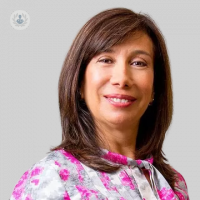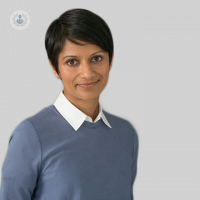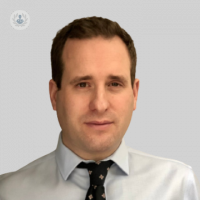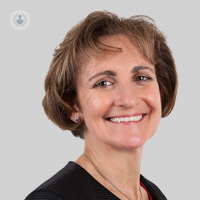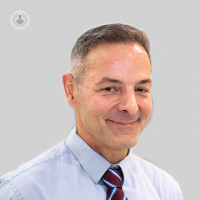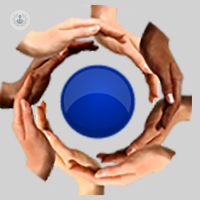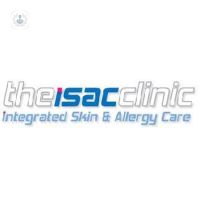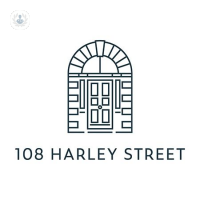What is acne?
Acne, otherwise known as acne vulgaris is a very common skin condition, usually featuring blackhead and whitehead spots, which happens when hair follicles and pores become blocked by oil and dead skin cells.
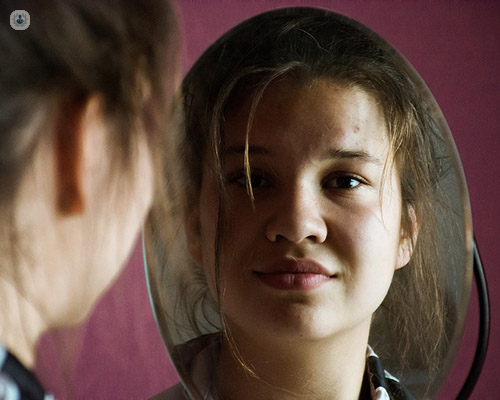
What are the different types of acne?
The six main types of acne are as follows:
- Blackheads – Small, black or brown spots that are caused when the open pore is clogged with oil which turns brown due to pigmentation in the follicle.
- Whiteheads – These are similar to blackheads, but are white in colour due to being filled with pus. In these cases, the pore is blocked and won’t pop when they are squeezed.
- Papules – These appear as small, red bumps, and may be sore to the touch.
- Pustules – these are the same as papules, but are further developed with a white tip at the centre caused by the build-up of pus.
- Nodules – These exist under the skin, rather than on the surface and appear as large painful lumps.
- Cysts – These are the most severe, and look similar to boils. They appear as large pus-filled lumps and carry the greatest risk of scarring.
What are the causes of acne?
Acne is usually linked with hormonal changes that occur during puberty, though it can start at any age. When testosterone hormones become active during puberty in both males and females, the sebaceous glands (those that produce the sebum oil that is secreted onto the skin) become oversensitive and produce excessive amounts of oil. The excess oil, combined with bacteria on the skin and dead skin cells not being shed properly, can cause hair follicles and pores to become blocked.
The bacteria that normally lives on the skin without any problems, then begins to multiply which causes inflammation and the creation of pus-filled spots. Acne can also be hereditary, meaning that if one or both of your parents had acne, it’s more likely that you will have it. There is no evidence that diet or poor hygiene cause acne.
How can acne be prevented?
It may not be possible to prevent acne, but you may be able to reduce the affects. Avoid squeezing the spots or clearing out the blackheads as this can lead to scarring and make the spots worse.
Don’t wash the areas affected by acne too frequently, as it can irritate the skin and make the condition worse, when the area is washed, use lukewarm water, as water that is too hot or cold can make the acne worse. Finally, always make sure you shower after exercise, and remove makeup before bed, to ensure that your pores remain unblocked.
How is acne treated?
The symptoms of acne can be treated effectively in a variety of different ways. You may be able to get over-the-counter creams from the pharmacy that can help with the symptoms. Your consultant dermatologist will be able to prescribe treatments that are unavailable over the counter, such as certain laser acne treatments to help reduce the appearance of acne scars.
11-13-2012 11-10-2023Acne
Dr Emilia Duarte Williamson - Dermatology
Created on: 11-13-2012
Updated on: 11-10-2023
Edited by: Conor Lynch
What is acne?
Acne, otherwise known as acne vulgaris is a very common skin condition, usually featuring blackhead and whitehead spots, which happens when hair follicles and pores become blocked by oil and dead skin cells.

What are the different types of acne?
The six main types of acne are as follows:
- Blackheads – Small, black or brown spots that are caused when the open pore is clogged with oil which turns brown due to pigmentation in the follicle.
- Whiteheads – These are similar to blackheads, but are white in colour due to being filled with pus. In these cases, the pore is blocked and won’t pop when they are squeezed.
- Papules – These appear as small, red bumps, and may be sore to the touch.
- Pustules – these are the same as papules, but are further developed with a white tip at the centre caused by the build-up of pus.
- Nodules – These exist under the skin, rather than on the surface and appear as large painful lumps.
- Cysts – These are the most severe, and look similar to boils. They appear as large pus-filled lumps and carry the greatest risk of scarring.
What are the causes of acne?
Acne is usually linked with hormonal changes that occur during puberty, though it can start at any age. When testosterone hormones become active during puberty in both males and females, the sebaceous glands (those that produce the sebum oil that is secreted onto the skin) become oversensitive and produce excessive amounts of oil. The excess oil, combined with bacteria on the skin and dead skin cells not being shed properly, can cause hair follicles and pores to become blocked.
The bacteria that normally lives on the skin without any problems, then begins to multiply which causes inflammation and the creation of pus-filled spots. Acne can also be hereditary, meaning that if one or both of your parents had acne, it’s more likely that you will have it. There is no evidence that diet or poor hygiene cause acne.
How can acne be prevented?
It may not be possible to prevent acne, but you may be able to reduce the affects. Avoid squeezing the spots or clearing out the blackheads as this can lead to scarring and make the spots worse.
Don’t wash the areas affected by acne too frequently, as it can irritate the skin and make the condition worse, when the area is washed, use lukewarm water, as water that is too hot or cold can make the acne worse. Finally, always make sure you shower after exercise, and remove makeup before bed, to ensure that your pores remain unblocked.
How is acne treated?
The symptoms of acne can be treated effectively in a variety of different ways. You may be able to get over-the-counter creams from the pharmacy that can help with the symptoms. Your consultant dermatologist will be able to prescribe treatments that are unavailable over the counter, such as certain laser acne treatments to help reduce the appearance of acne scars.
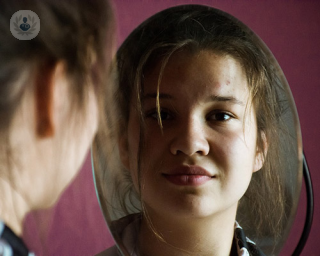

Will acne go away with age?
By Dr Zoi Tsianou
2024-11-21
Acne is a common condition affecting many of us in our teenage years. Most adolescents develop acne in some form, causing breakouts, oily skin, and sometimes causing pain. Leading Harley Street dermatologist Dr Zoi Tsianou explains who is affected, and how the problem can be solved. See more
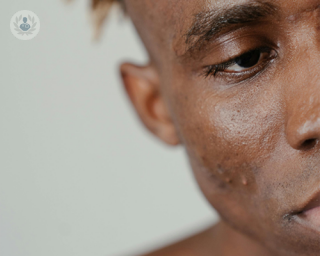

How does stress impact the skin?
By Dr Christina Leitner
2024-11-20
Stress is a common experience in today's fast-paced world, and its effects extend beyond mental health to impact various aspects of physical well-being, including the skin. In this informative article, leading consultant dermatologist Dr Christina Leitner explores how stress can affect the skin and what measures can be taken to mitigate its impact. See more
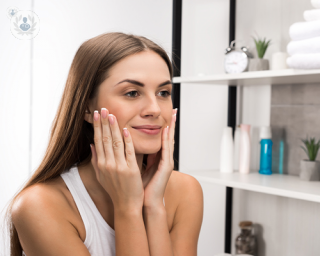

How to effectively manage acne
By Dr Sabina Ghani
2024-11-20
Acne is a condition which can negatively affect a person’s self-confidence, making them feel embarrassed and ashamed about their appearance. Dr Sabina Ghani provides a guide to skincare routines, prevention strategies and treatment options for the condition. See more
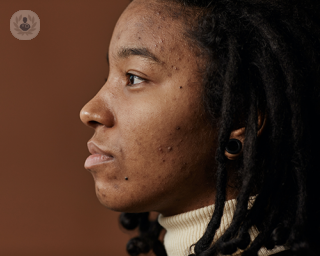

Ask an expert: should acne be treated with antibiotics?
By Dr Íñigo de Felipe
2024-11-20
Dermatologists sometimes prescribe antibiotics to kill bacteria and treat severe breakouts caused by acne. Antibiotic use has become increasingly discouraged in recent years, however, due to their severe side effects. Dr Íñigo De Felipe, leading consultant dermatologist, explains where the issue lies and how to address it. See more
Experts in Acne
-
Dr Saqib Jawaid Bashir
DermatologyExpert in:
- Mohs surgery
- Cosmetic dermatology
- Laser
- Skin cancer
- Scars
- Acne
-
Dr Gayathri Perera
DermatologyExpert in:
- Skin cancer
- Acne
- Rosacea
- Paediatric dermatology
- Psoriasis
- Autoimmune diseases
-
Dr Ben Esdaile
DermatologyExpert in:
- Psoriasis
- Acne
- Skin cancer
- Paediatric dermatology
- Nail diseases
- Dermoscopy
-
Dr Hélène Menagé
DermatologyExpert in:
- Skin allergies
- Acne
- Photodynamic therapy
- Sun allergy
- Skin cancer
- Eczema
-
- See all

Harley Street Dermatology Clinic
Harley Street Dermatology Clinic
10 Harley Street, London W1G 9PF
No existe teléfono en el centro.
By using the telephone number provided by TOP DOCTORS, you automatically agree to let us use your phone number for statistical and commercial purposes. For further information, read our Privacy Policy
Top Doctors

The ISAC Clinic
The ISAC Clinic
17 Grove Court, Beaconsfield, Buckinghamshire HP9 1QW
No existe teléfono en el centro.
By using the telephone number provided by TOP DOCTORS, you automatically agree to let us use your phone number for statistical and commercial purposes. For further information, read our Privacy Policy
Top Doctors

108 Harley Street Medical
108 Harley Street Medical
108 Harley Street
No existe teléfono en el centro.
By using the telephone number provided by TOP DOCTORS, you automatically agree to let us use your phone number for statistical and commercial purposes. For further information, read our Privacy Policy
Top Doctors
-
Harley Street Dermatology Clinic
10 Harley Street, London W1G 9PF, West LondonExpert in:
- Skin Cancer
- Dermatology
- Clinical Dermatology
- Cosmetic Dermatology
- Skin lesions
- Skin rejuvenation
-
The ISAC Clinic
17 Grove Court, Beaconsfield, Buckinghamshire HP9 1QW, BeaconsfieldExpert in:
- Allergy
- Anti-aging
- Skin Cancer
- Clinical Dermatology
- Cosmetic Dermatology
- Surgical Dermatology
-
108 Harley Street Medical
108 Harley Street, W1G Marylebone LondonExpert in:
- Vascular Surgery
- Dermatology
- Diagnostic Imaging
- Women’s health
- Sports Medicine
- Rehabilitation
- See all
- Most viewed diseases, medical tests, and treatments
- Hormone therapy
- Migraine
- Autoimmune diseases
- Joint pain
- Nutrition
- Weight loss injections
- Endermologie
- Polynucleotides
- Abdominal pain
- Endovenous laser treatment (EVLA)
